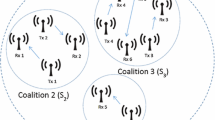Abstract
In this paper, the problem of distributed opportunistic scheduling by mobile users is investigated for a wireless cooperative network. Based on coalition formation game model, a theoretic framework is built in which users cooperate in accessing the shared channel in an individual view of average throughput. To analyze users rational behaviors, we propose a coalition formation approach which guides cooperative delivery by mobile users in distributed manner. Under the approach, users form a coalition structure in a dynamic manner, for which an optimal distributed cooperative scheduling strategy is derived maximizing average network throughput. Based on individual utilities, users make their own decisions to join or leave a coalition. To obtain a stable coalition structure, a distributed coalition formation algorithm is designed to adapt coalitions to environmental changes. The effectiveness and efficiency are verified by numerical simulations.






Similar content being viewed by others
Notes
In typically wireless environments, u takes a value from 2 to 5.
The time slot is the shortest unit by which the channel occupancy is sensed.
That idle slot tells other sources that \(s_i\) decides to continue.
The subscript n represents the observed rate at nth observation.
References
Andrews M, Kumaran K, Ramanan K, Stolyar A, Whiting P, Vijayakumar R (2001) Providing quality of service over a shared wireless link. IEEE Communications Magazine 39(2):150–154
Zheng D, Ge W, Zhang J (2009) Distributed opportunistic scheduling for ad hoc networks with random access: an optimal stopping approach. IEEE Transactions on Information Theory 55(1):205–222
Ge W, Zhang J, Wieselthier J, Shen X (2009) PHY-aware distributed scheduling for ad hoc communications with physical interference model. IEEE Transactions on Wireless Communications 8(5):2682–2693
Tan S, Zheng D, Zhang J, Zeidler J (2010) Distributed opportunistic scheduling for ad-hoc communications under delay constraints. In: Proc. IEEE INFOCOM 2010
Xie L-L, Kumar PR (2005) An achievable rate for the multiple-level relay channel. IEEE Transactions on Information Theory 51(4):1348–1358
Laneman JN, Tse DNC, Wornell GW (2004) Cooperative diversity in wireless networks: efficient protocols and outage behavior. IEEE Transactions on Information Theory 50:3062–3080
Zhang J, Jia J, Zhang Q, Lo EMK (2010) Implementation and evaluation of cooperative communication schemes in software-defined radio testbed. In: Proc. IEEE INFOCOM 2010
Zhang Q, Jia J, Zhang J (2009) Cooperative relay to improve diversity in cognitive radio networks. IEEE Communnications Magazine 47(2):111–117
Gunduz D, Erkip E (2007) Opportunistic cooperation by dynamic resource allocation. IEEE Transactions on Wireless Communnications 6(4):1446–1454
Jing Y, Jafarkhani H (2009) Network beamforming using relays with perfect channel information. IEEE Transactions on Information Theory 55(6):2499–2517
Gong X, Chandrashekhar TPS, Zhang J, Poor HV (2012) Opportunistic cooperative networking: to relay or not to relay? IEEE Journal on Selected Areas in Communications 30(2):307–314
Zhang Z, Jiang H (2012) Distributed opportunistic channel access in wireless relay networks. IEEE Journal on Selected Areas in Communications 30(9):1675–1683
Zhang Z (2012) Distributed opportunistic channel access in wireless relay networks, Technical report
Saavedra AG, Banchs A, Serrano P, Widmer J (2012) Distributed Opportunistic Scheduling: A Control Theoretic Approach, In: Proc. IEEE INFOCOM 2012
Banchs A, Ortin J, Saavedra A, Leith DJ, Serrano P (2016) Thwarting Selfish Behavior in 802.11 WLANs. IEEE Transactions on Networking 24(1):492–505
Saad W, Han Z, Hjorungnes A, Niyato D, Hossain E (2011) Coalition formation games for distributed cooperation among roadside units in vehicular networks. IEEE Journal on Selected Areas in Communications 29(1):48–60
Saad W, Han Z, Basar T, Debbah M, Hjorungnes A (2011) Network formation games among relay stations in next generation wireless networks. IEEE Transactions on Communications 59(9):2528–2542
Schmitz N (1993) Optimally sequentially planned decision procedures. Springer-Verlag, New York
Ferguson T (2006) Optimal stopping and applications, preprint, Mathematics Department, UCLA
Acknowledgements
The paper was supported by the National Natural Science Foundation of China under Grant 62171456 and 61801504.
Author information
Authors and Affiliations
Corresponding author
Rights and permissions
About this article
Cite this article
Xie, J., Zhang, Z., Yan, Y. et al. DOS by Dynamic Groups: a Coalition Formation Game Perspective. Mobile Netw Appl 28, 334–345 (2023). https://doi.org/10.1007/s11036-022-01952-4
Accepted:
Published:
Issue Date:
DOI: https://doi.org/10.1007/s11036-022-01952-4




